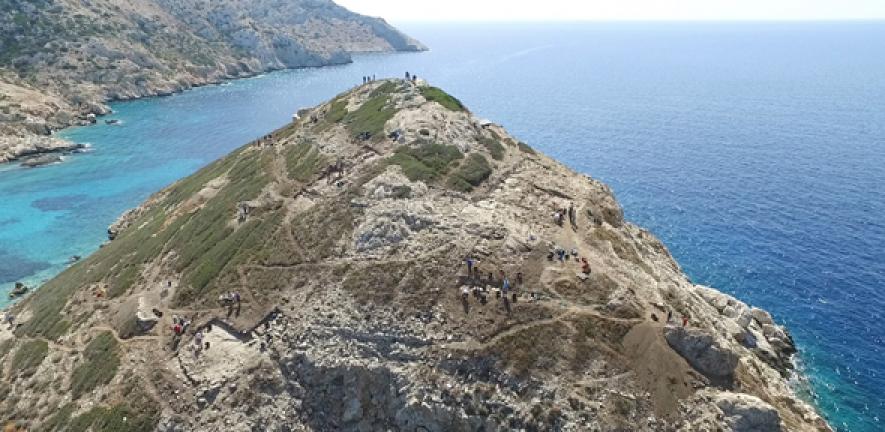Greek Islands like Crete and Santorini are famous for many things – white buildings that ladder up the sides of rising landmasses; donkeys making their way up trails cars cannot access; and wonderful seaside “tavernas” that cater to tourists who come from around the globe.
Greece is also the founding civilization of democracy, and its history dates back thousands of years, offering archaeologists and historians the chance to delve deeply into evidence of how our modern world, and our guiding philosophies, developed.
Over the past almost six years, archaeologists and other researchers have delved into the mysteries of a small island about 125 miles from Athens, in the Aegean Sea. Not an island famous to tourists, certainly, but a vitally important place nonetheless.
About Dhaskalio
The island is relatively small in size, but it’s massive in the amount of historical and scientific data it holds, revealing much about the beginnings of civilization in the area. The community established there dates back 4,600 years, experts say, and the whole island is shaped rather like an Egyptian pyramid. Its name is Dhaskalio. The island has the remains of complex drainage systems and stairways, as well as other striking structures, proving that all those thousands of years ago, the people who lived there developed a sophisticated society.
Thousands of tons of marble had to be taken to Dhaskalio to build these systems, indicating that the men who carried it were adept at transporting the heavy rock by sea. Back then, of course, there were no massive cargo ships to carry the load; the sailors had to improvise a way of toting the incredibly heavy marble to their destination.
As part of the Keros Cambridge Project, archaeologists have been excavating and studying Dhaskalio since 2015, uncovering vast amounts of evidence of a sophisticated community of people who imported material to the island for metalworking. In addition to metal kilns, researchers have found spearheads, axes, chisels, daggers, and more, all pointing to a community that excelled at an intricate and difficult craft — fashioning tools and weapons from sources imported to the island.
Structures on Dhaskalio also point to the sophisticated skills of the builders there, according to Cambridge professor and co-director of the project, Colin Renfrew. In a statement released a few months ago, Renfrew noted, “…we see a number of sophisticated architectural techniques employed in a well thought out manner,” such as the stairways and huge entranceways.
Dhaskalio is part of the Cycladic Islands, a group of small islands that experts say date back to the Early Bronze Age. That period existed between 3200 B.C. until 1050 B.C, and Dhaskalio in particular dates to approximately 2750 B.C. The ruins, artifacts, and other evidence found there indicate that this is the “earliest maritime sanctuary in the world,” Renfrew explained.
Keros is an island very close to Dhaskalio, and while it is uninhabited today, it too bears key remains of an ancient civilization that knew a great deal about complex architectural techniques. It was first explored and excavated in the 1960s. Since that time, three projects have been established on Keros, and now experts have turned their attention to neighboring Dhaskalio. According to Renfrew, the island offers the “clear impression” that a highly skilled architect with amazing building acumen led the projects on Dhaskalio, establishing a remarkable community of talented inhabitants.
More about Ancient Greek cities: Phanagoria was the largest ancient Greek city, now about a third of the city is underwater
Greece is home to some of the earliest, and most spectacular, archaeological sites in the world, and now this team of experts is offering fresh insights and information to the modern world, about a highly developed and clearly sophisticated ancient one.
